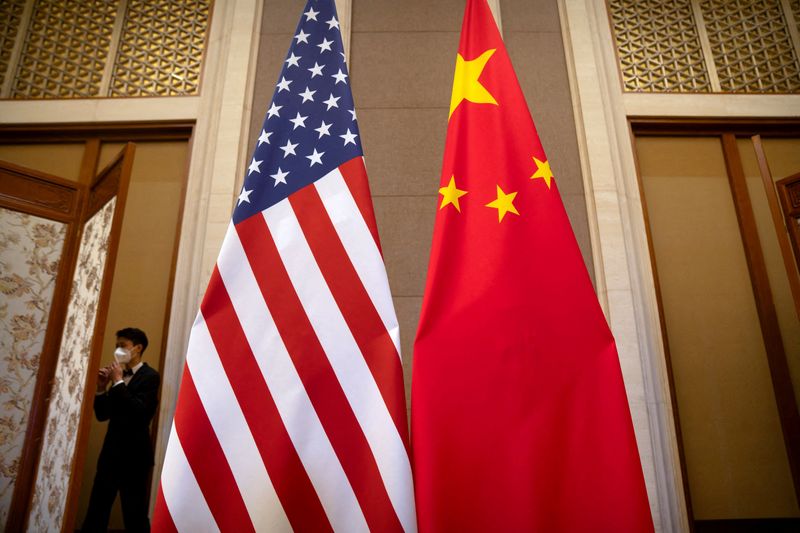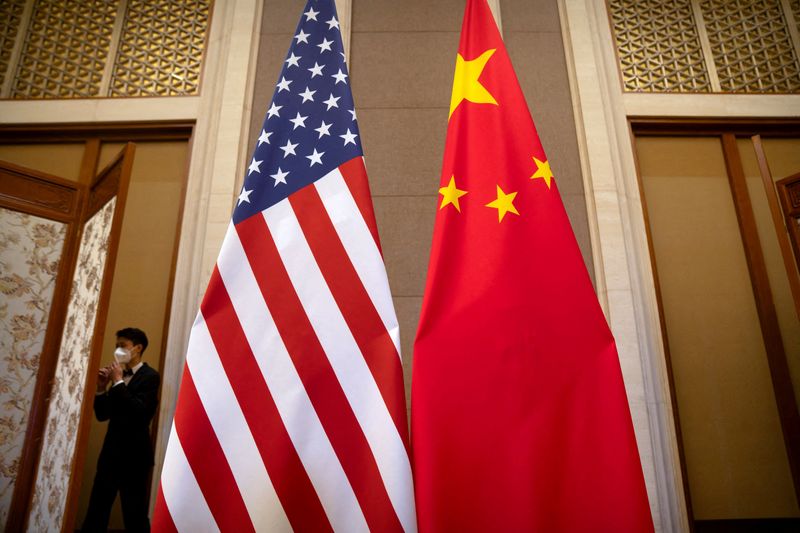Economy
US willing to take ‘targeted’ actions against China for national security, Treasury official says


© Reuters. FILE PHOTO: A staff member wearing a face mask walks past United States and Chinese flags set up before a meeting between Treasury Secretary Janet Yellen and Chinese Vice Premier He Lifeng at the Diaoyutai State Guesthouse in Beijing, China, Saturday, Jul
WASHINGTON (Reuters) – U.S. Treasury Undersecretary Jay Shambaugh said on Wednesday the Biden administration will not hesitate to take targeted actions against China to secure the national security interests of the U.S. and its allies and to protect human rights, but added that the two countries must cooperate on global challenges.
In prepared testimony before the U.S. Senate Foreign Relations Committee, Shambaugh said economic decoupling would be “disastrous” for both the U.S. and China and nearly impossible to achieve.
“When necessary, we will use a suite of tools to achieve our national security goals. It is our core mission to protect the American people from national security risks while also clearly communicating our position and intent to China to reduce the risk of misunderstanding,” said Shambaugh, who heads Treasury’s international affairs.
The Biden administration is weighing new restrictions on outbound private investment into China and other countries of concern. The Senate voted overwhelmingly on Tuesday to back legislation that would require U.S. companies to notify federal agencies of proposed investments in Chinese technologies such as semiconductors and artificial intelligence.
“To be clear: neither targeted national security actions nor attempts to build diversified supply chains represent decoupling,” Shambaugh said in the prepared remarks. “We seek a fair and healthy economic relationship that benefits both countries and supports American workers and businesses.”
U.S. Treasury Secretary Janet Yellen visited Beijing earlier this month to reopen communications and make the same points to China’s economic leaders, saying the trip put the relationship on “surer footing,” though the world’s two largest economies remained at odds over many issues.
Shambaugh said these differences included U.S. objections to Chinese “non-market” economic practices and excessive government support that put U.S. companies at a disadvantage. He added that the U.S. has also objected to China’s “economic coercion” to punish countries for diplomatic actions by cutting off imports or exports.
He said the Treasury also has been troubled by China’s recent punitive actions against U.S. firms and export controls on critical minerals for semiconductors.
“While we are still assessing their impact, these actions reinforce the importance of our administration’s efforts to build resilient and diversified supply chains,” Shambaugh added.
AREAS OF COOPERATION
Shambaugh, who took over as the Treasury’s top economic diplomat in January, said the U.S. and China must also be able to cooperate on pressing global challenges, such as climate change and growing debt distress in developing countries. The Treasury’s engagement with China has yielded some dividends, including progress on debt restructurings for Zambia, Ghana and Sri Lanka, but more needs to be done, he added.
He also said protecting U.S. economic interests requires “strong and reliable international leadership.”
This requires stronger engagement with allies and partners, particularly low- and middle-income countries, he said, adding that this also requires making sure that the International Monetary Fund and World Bank are “adequately” funded.
Ensuring that there is a sufficient amount of “high-standards” lending available to low-income countries through these and other international financial institutions will help keep them from becoming dependent on loans from China, he added.
Economy
Russian central bank says it needs months to make sure CPI falling before rate cuts -RBC


© Reuters. Russian Central Bank Governor Elvira Nabiullina attends a news conference in Moscow, Russia June 14, 2019. REUTERS/Shamil Zhumatov/File Photo
MOSCOW (Reuters) – Russia’s central bank will need two to three months to make sure that inflation is steadily declining before taking any decision on interest rate cuts, the bank’s governor Elvira Nabiullina told RBC media on Sunday.
The central bank raised its key interest rate by 100 basis points to 16% earlier in December, hiking for the fifth consecutive meeting in response to stubborn inflation, and suggested that its tightening cycle was nearly over.
Nabiullina said it was not yet clear when exactly the regulator would start cutting rates, however.
“We really need to make sure that inflation is steadily decreasing, that these are not one-off factors that can affect the rate of price growth in a particular month,” she said.
Nabiullina said the bank was taking into account a wide range of indicators but primarily those that “characterize the stability of inflation”.
“This will take two or three months or more – it depends on how much the wide range of indicators that characterize sustainable inflation declines,” she said.
The bank will next convene to set its benchmark rate on Feb. 16.
The governor also said the bank should have started monetary policy tightening earlier than in July, when it embarked on the rate-hiking cycle.
Economy
China identifies second set of projects in $140 billion spending plan


© Reuters. FILE PHOTO: Workers walk past an under-construction area with completed office towers in the background, in Shenzhen’s Qianhai new district, Guangdong province, China August 25, 2023. REUTERS/David Kirton/File Photo
SHANGHAI (Reuters) – China’s top planning body said on Saturday it had identified a second batch of public investment projects, including flood control and disaster relief programmes, under a bond issuance and investment plan announced in October to boost the economy.
With the latest tranche, China has now earmarked more than 800 billion yuan of its 1 trillion yuan ($140 billion) in additional government bond issuance in the fourth quarter, as it focuses on fiscal steps to shore up the flagging economy.
The National Development and Reform Commission (NDRC) said in a statement on Saturday it had identified 9,600 projects with planned investment of more than 560 billion yuan.
China’s economy, the world’s second largest, is struggling to regain its footing post-COVID-19 as policymakers grapple with tepid consumer demand, weak exports, falling foreign investment and a deepening real estate crisis.
The 1 trillion yuan in additional bond issuance will widen China’s 2023 budget deficit ratio to around 3.8 percent from 3 percent, the state-run Xinhua news agency has said.
“Construction of the projects will improve China’s flood control system, emergency response mechanism and disaster relief capabilities, and better protect people’s lives and property, so it is very significant,” the NDRC said.
The agency said it will coordinate with other government bodies to make sure that funds are allocated speedily for investment and that high standards of quality are maintained in project construction.
($1 = 7.1315 renminbi)
Economy
Russian central bank says it needs months to make sure CPI falling before rate cuts -RBC


© Reuters. Russian Central Bank Governor Elvira Nabiullina attends a news conference in Moscow, Russia June 14, 2019. REUTERS/Shamil Zhumatov/File Photo
MOSCOW (Reuters) – Russia’s central bank will need two to three months to make sure that inflation is steadily declining before taking any decision on interest rate cuts, the bank’s governor Elvira Nabiullina told RBC media on Sunday.
The central bank raised its key interest rate by 100 basis points to 16% earlier in December, hiking for the fifth consecutive meeting in response to stubborn inflation, and suggested that its tightening cycle was nearly over.
Nabiullina said it was not yet clear when exactly the regulator would start cutting rates, however.
“We really need to make sure that inflation is steadily decreasing, that these are not one-off factors that can affect the rate of price growth in a particular month,” she said.
Nabiullina said the bank was taking into account a wide range of indicators but primarily those that “characterize the stability of inflation”.
“This will take two or three months or more – it depends on how much the wide range of indicators that characterize sustainable inflation declines,” she said.
The bank will next convene to set its benchmark rate on Feb. 16.
The governor also said the bank should have started monetary policy tightening earlier than in July, when it embarked on the rate-hiking cycle.

 Forex3 years ago
Forex3 years agoForex Today: the dollar is gaining strength amid gloomy sentiment at the start of the Fed’s week

 Forex3 years ago
Forex3 years agoUnbiased review of Pocket Option broker

 Forex3 years ago
Forex3 years agoDollar to pound sterling exchange rate today: Pound plummeted to its lowest since 1985

 Forex3 years ago
Forex3 years agoHow is the Australian dollar doing today?

 Cryptocurrency3 years ago
Cryptocurrency3 years agoWhat happened in the crypto market – current events today

 World3 years ago
World3 years agoWhy are modern video games an art form?

 Commodities3 years ago
Commodities3 years agoCopper continues to fall in price on expectations of lower demand in China

 Economy3 years ago
Economy3 years agoCrude oil tankers double in price due to EU anti-Russian sanctions





















